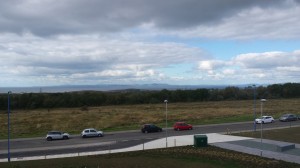The skies have cleared and Scotland is clearly back in view as part of the UK.
This photo shows the view from a classroom at the new Energy Coast UTC.
West Cumbrian Liberal Democrats fought to save the UK through traditional canvassing and through the use of traditional and social media. Rebecca Hanson took to using social medial. You can explore her views on Libdem Voice.
Phill Roberts went up to Scotland to campaign. Phill and Roger Putnam have been writing about the future of the UK in the local press. If you missed them they’re available below. Nick Clegg’s views are also well worth a read and are available here
Dear Sir
Scotland has now voted to remain part of our United Kingdom; however we should not underestimate the depth of feeling that brought us to the brink of Scotland going its own way.
A profound distrust of the current political and constitutional structures and our politicians over many years has now become entrenched in public opinion allowing nationalism to take the place of patriotism.
That such a sizeable minority of Scots voted Yes should be no surprise.
Already, vested interests in the Conservative and Labour parties are conspiring to block and undermine constitutional reform at a time when we should be listening to the call from our communities and regions for devolved powers from Westminster.
The call for devolved powers is however not new and some of the arguments for and against continue to be played out at a national and local level.
Devolution and the arguments for and against were a major issue within British politics in the mid 1990s resulting in John Prescott, then Deputy Prime Minister, attempting to devolve powers to the regions.
This attempt failed when the North East voted emphatically No albeit on a very low poll to the proposals. Will people be any more engaged in the debate following Scotland’s independence vote?
Some of the reasons that persuaded people to oppose devolution at the time included the cost of setting up new democratic structures and the possibility of having even more councillors at a time when the credibility of our democratic representatives were at an all time low; a position that has not improved greatly.
We certainly do not need more councillors, and constitutional reform should provide us with the opportunity to restructure our councils so that we have unitary authorities and strengthened parish councils.
Has Scotland and the Independence Vote refocused our belief in self determination and control over our own circumstances, tax raising, welfare, health, housing and economic development?
There is a widespread view that economic growth will only be balanced and sustainable with devolution of key economic powers and functions to our cities and that our cities will then be the drivers of economic growth.
However, would devolved powers to our cities and urban areas create further divisions and tensions, as indicated by the disagreements between our local councillors when rehashing old arguments about towns getting more resources than the villages and rural areas?
The current ambivalence to involvement in our democratic processes and distrust of our political representation will prove a considerable hurdle to getting the electorate engaged in the debate regarding devolving powers.
All people are calling for is a fair system that represents their wishes and feelings, not some system that supports party factional or vested interests.
Any model of devolution will be devalued undermined and not trusted unless we can support it with credible democratic structures and systems that people and communities can have confidence in.
There is therefore a strong argument that we should return to the call for devolution: an English Parliament and a federal system of governance. However, this time we should also guarantee that we have a fairer voting system where everyone’s vote counts and everyone feels included.
Simply giving more powers to English MPs does nothing to empower our local communities and regions.
Rebuilding confidence in our democratic systems and representation can only be achieved with an open and transparent process of devolving powers from Westminster that ensures Localism meets the needs of all in our communities and is not simply another “buzzword”.
We need to know your views. Please leave any comments on www.wcldfocusteam.org.uk where you will also find further information, or contact Phill on twitter @phillrobertsli1
Phill Roberts
(Chair, Copeland & Workington Liberal Democrats)
07730284529

